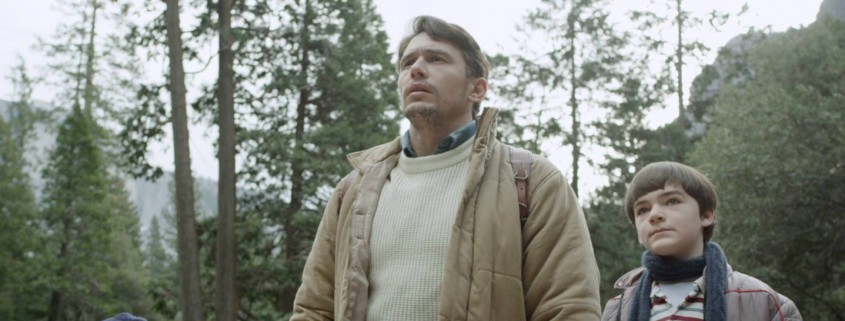James Franco relives childhood experiences in newest film
The School of Cinematic Arts hosted a conversation with actor and former adjunct professor James Franco and SCA alumni Clara Aranovich and Nicolaas Bertelsen on their new film, Yosemite, Tuesday night. Franco stars in the film that Aranovich and Bertelsen produced, which was released on DVD and became available for online download Tuesday.
The film was written and directed by Gabrielle Demeestere, who based it off of the short stories “Yosemite” and “Peter Parker” from Franco’s book, A California Childhood. Its opening scene — a father with his two boys on a family trip in Yosemite National Park — was, according to Franco, the part of the film that was most closely based off of his personal experiences.
“It was strange, re-living those experiences from my father’s perspective,” Franco said. “Going there and playing the father made me realize what a gift it was, the time and effort my father spent to take us out there and share that with us. I saw it from a completely different angle.”
Yosemite follows the lives of three fifth-grade boys in 1985 Palo Alto, California, a quiet Bay Area suburb where a mountain lion is on the prowl and each child has to come to terms with his identity and his relationships with others. The film runs on an undercurrent of tension, a building dread that something terrible is going to happen — but even as each threat fails to materialize, viewers are still left with a sense of lingering unease. This feeling, according to Franco, is what the producers of the film hoped would echo the discomfort and fear of the unknown that comes with growing up.
“I wanted [that feeling] to be on the fringe, to be a kind of haunting force rather than something they actually have to battle,” Franco said.
Franco, whose experiences formed the basis for the film, said that he hadn’t originally planned to take on an acting role, instead focusing on promoting a campaign that raised $325,929 for the film and its sequels on Indiegogo. However, when Demeestere asked him to appear in the film, Franco agreed, recognizing that the small-budget venture — which plans to donate all of its profits to charity — would need as much help as it could get. Throughout the process, Franco realized that despite his role in writing the book that inspired the film adaptation, he wanted to let Demeestere and the producers adapt the story as they saw fit.
“If I did give feedback it would be more as a participant in a movie as if it were any other movie, not one based on my stories,” Franco said. “I wanted to make sure it worked in the best way possible rather than having [the crew] follow my version of things. A movie is a different thing than a piece of prose, and I had no desire to enforce my opinion; I wanted it to become something new.”
Filming in Palo Alto, according to Bertelsen and Aranovich, had its own unique set of challenges, from the time limit — only 12-13 days — to the limited access to locations such as train tracks, which came with a host of legal and ethical complications. Throughout the experience, however, Bertelsen explained that he appreciated having the opportunity to work on location for a film where the setting is integral to the story.
“I loved shooting in a place that feels like a small town, where you get that moral support from locals,” Bertelsen said.
Toward the end of the discussion, the filmmakers gave their advice for SCA students looking to pursue a career in the film industry, from production to acting. According to Aranovich, the key is to remain conscious of others in a field that so often prioritizes the individual.
“The experience of working with you should speak for itself,” Aranovich said. “A lot of people neglect the fact that they are their own brand as a collaborator, as well as what they’re producing. Remember to be good to people, and you’ll make good work.”

